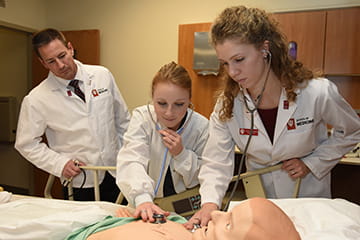 IU School of Medicine strives to provide a positive, inclusive environment that is conducive to teaching and learning and embodies the core values of excellence, respect, integrity, diversity and cooperation. All members of the IU School of Medicine community are expected to uphold the tenets of the Honor Code. To maintain the highest standards of professionalism, IU School of Medicine responds in a systematic manner to incidents of student mistreatment and violations of the Honor Code and Teacher-Learner Conduct Policy. Similarly, by recognizing exemplars of professionalism, those who model the IU School of Medicine Honor Code through daily interactions with others, the School demonstrates its core values in action.
IU School of Medicine strives to provide a positive, inclusive environment that is conducive to teaching and learning and embodies the core values of excellence, respect, integrity, diversity and cooperation. All members of the IU School of Medicine community are expected to uphold the tenets of the Honor Code. To maintain the highest standards of professionalism, IU School of Medicine responds in a systematic manner to incidents of student mistreatment and violations of the Honor Code and Teacher-Learner Conduct Policy. Similarly, by recognizing exemplars of professionalism, those who model the IU School of Medicine Honor Code through daily interactions with others, the School demonstrates its core values in action.
Prevention and Education
Learner Feedback
The School relies on learner feedback to continuously monitor and improve the learning environment—both to identify concerns in the learning environment as well as when IU School of Medicine is at its best. Several avenues are available for learner input, including course and clerkship evaluations, evaluations of individual instructors, the annual Association of American Medical Colleges (AAMC) Graduation Questionnaire, and information submitted through the school’s Mistreatment Reporting Process.
To recognize exemplars of the learning environment is at its best and celebrate those who best model the Honor Code each and every day, IU School of Medicine encourages learners to nominate faculty, residents, fellows, other students and staff members of IU School of Medicine community for recognition on the Exemplar of Professionalism Honor Roll. Nominations are temporarily suspended to align the process and criteria with the newly revised Honor Code.